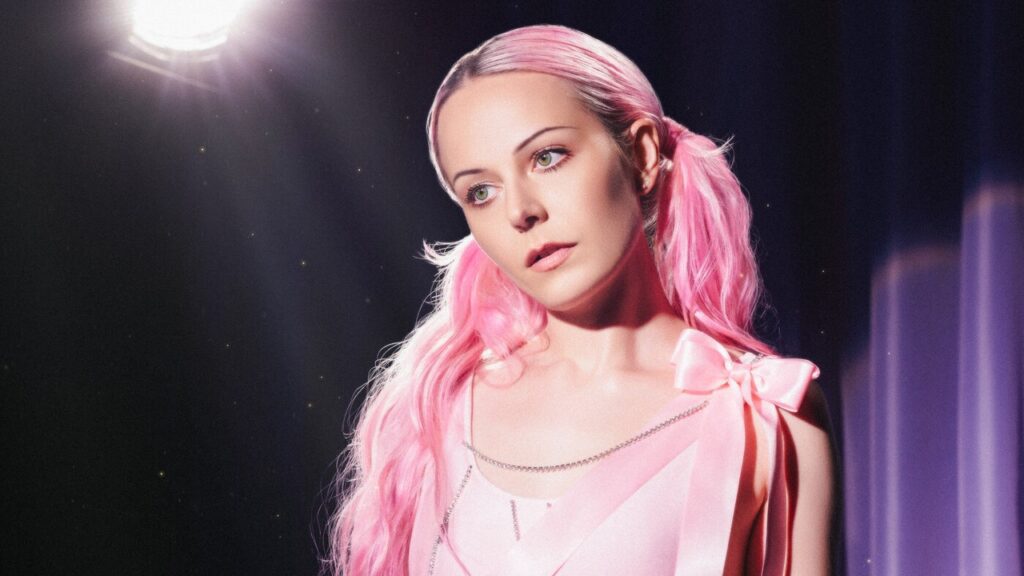
In 2013, the Oxford Dictionaries named “selfie” its word of the year. Not coincidentally, that’s also when hyperpop star and digital photographer Hannah Diamond debuted with the London label PC Music. Working alongside producer and label mastermind A. G. Cook, Diamond created high-concept electronic pop, as well as her own hyper-stylized, highly Photoshopped portraits. But a photo—even a bespoke self-portrait in sparkling high definition—can only tell you so much about a person. Perfect Picture, Diamond’s second and final album for the label, which will cease to release new music come January, is an earnest quest to capture her essence as a person and an artist—and a winking commentary on the construction of reality and the path to self-acceptance.
Early in Diamond’s career, her chirpy, processed vocals and hyper-feminine, seemingly plastic persona led some observers to doubt her mere existence. Her 2019 debut, Reflections, didn’t do much to change that Vocaloid-like posture, and its arrival was overshadowed by the fact that most of its songs had already been released. Perfect Picture, produced by David Gamson (Kesha, Charli XCX), has a much warmer palette than its predecessor. What was once a crystalline shell of mourning for insecurities and broken online relationships has matured into a dial-up dream of early-aughts stardom made real in 2023. HD is past sounding high definition: Perfect Picture embraces a blurrier resolution where pitch-shifted vocals glitch in and out of static and punchy, arpeggiated synths leap into massive choruses. Even the relatively downtempo cuts (“Flashback,” “Unbreakable”) carry a fresh buoyancy.
As Diamond steers away from the icy, sad-girl trappings of her earlier work, she morphs into a more upbeat, motivational pop star, something like Hilary Duff’s ’00s teenie-bop classic “What Dreams Are Made Of” by way of Eurodance hitmaker DJ Sammy and mid-tempo Britney deep cuts. If the connection between these oft-maligned pop gems isn’t readily obvious, their influence on Perfect Picture’s digitally mediated yet heartfelt emotional landscape is. “Want You to Know” is tinged with Eurodance, while the modulated backing vocals of Spears’ 2008 song “Unusual You” can be heard all over the record.
Lyrically, Perfect Picture covers a lot of the same ground as Reflections with renewed optimism. Many songs are ostensibly about Diamond’s own experiences—references to pixels, touchscreens, and photo-editing tools abound. Almost all the songs are knowingly self-referential, and the meta humor that’s a PC Music signature serves to highlight the genuine emotion behind them. Diamond is still contemplating her flaws, targeting imposter syndrome in “Poster Girl” and “Lip Sync” and uncertain relationships in cuts like “Impossible” and “Divisible by Two.” Instead of wallowing, she draws newfound strength from the cracks in her self-image. “When I focus on what’s perfect/I never notice the imperfections in moments that make life so worth it,” she admits on “Poster Girl.” Time and again, Diamond reiterates that artifice doesn’t negate sincerity, just as her role in constructing it doesn’t vacate her agency.
With Gamson and her co-writers (including Cook, though his presence is less felt this time around), Diamond cushions gentle self-empowerment earworms in fuzzy synthesizers and decks them in pink ribbons and bows. Notable among the credits, besides several songs written with SOPHIE collaborator Cecile Believe, is the early standout “Want You to Know,” an old Kesha demo that Diamond has airbrushed in her own image. On the surface, she’s asking a potential partner to see her for who she truly is, but the message is aimed inward too, one of the record’s many mantras of self-worth.
Perfect Picture hits its sweet spot with the mid-album trio of “Flashback,” “No FX,” and “Lip Sync.” “Flashback” tenderly reflects on a bygone relationship, lowering the emotional temperature a notch, before the sugary love song “No FX” picks it back up again to become the album’s shimmering centerpiece. “I’ve never been so at ease/With you, I feel like myself completely,” Diamond sings. Vocoders puncture her words but leave the “completely” crystal clear, just in case you thought she was still consumed by self-doubt. On “Lip Sync,” Diamond wonders if one day she’ll “be the real thing.” It’s a funny question to ask—one that echoes some of her earliest critics. But that doesn’t seem to bother her: For Diamond, the image of the girl lip syncing in the mirror is just another reflection of the pop star’s existential duality.
